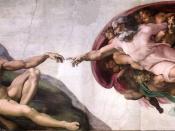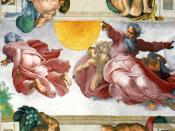With the development of stable communities, agriculture and writing, ancient man for the first time in history found himself with the leisure to ponder the nature of the universe and his role in it. These "ponderings" found their way into religious life as recited stories, and eventually on written records. These cultures had neither the technology nor the historical perspective to posit a natural explanation. Therefore, the genesis of these ancient cosmologies was embedded in supernatural myths. Though supernatural, these myths projected strong anthropomorphic and anthropocentric ontologies. Two examples of this mind set are the works of Hesiod, Theogany and Works and Days, and the first three chapters of Genesis in The Bible. An exploration of these works will demonstrate some of the similar and opposing views the ancient man held about the world he in which he lived.
By examining basic tenets observed in these cosmogonies, certain comparisons may be drawn as well as many contrasts.
These tenets are answered by posing questions to the representative myths; these questions are as follows: 1) What was the origin of creation? 2) What was the order of creation? 3) What is the nature of the creator(s) 4)What was the nature of the universe? And 5) What was the role of man in that universe? The origin of creation in Hesiod bares striking similarities to that of Genesis chapter 1. Hesiod declares in his Musical song, "[f]irst of all Chaos came into being" (Theogany, ln. 116). Chaos is representative of a primordial womb, often embodied in ancient cosmogonies as an abyss, a void or water. Chaos is a spontaneously created being with apparent aseity, and it is from this primordial being that further creation is spawned and separated. Genesis states that after God created the heavens and the earth, "the earth...


